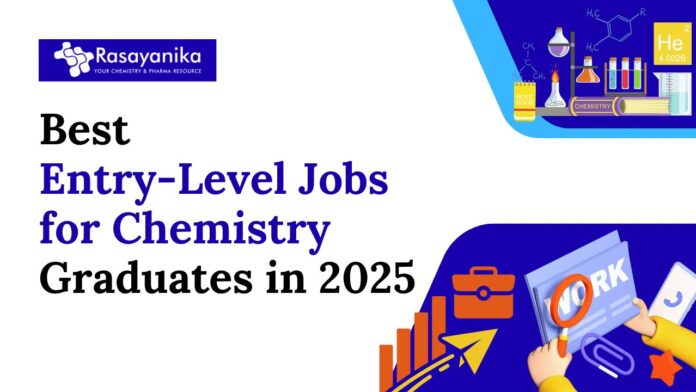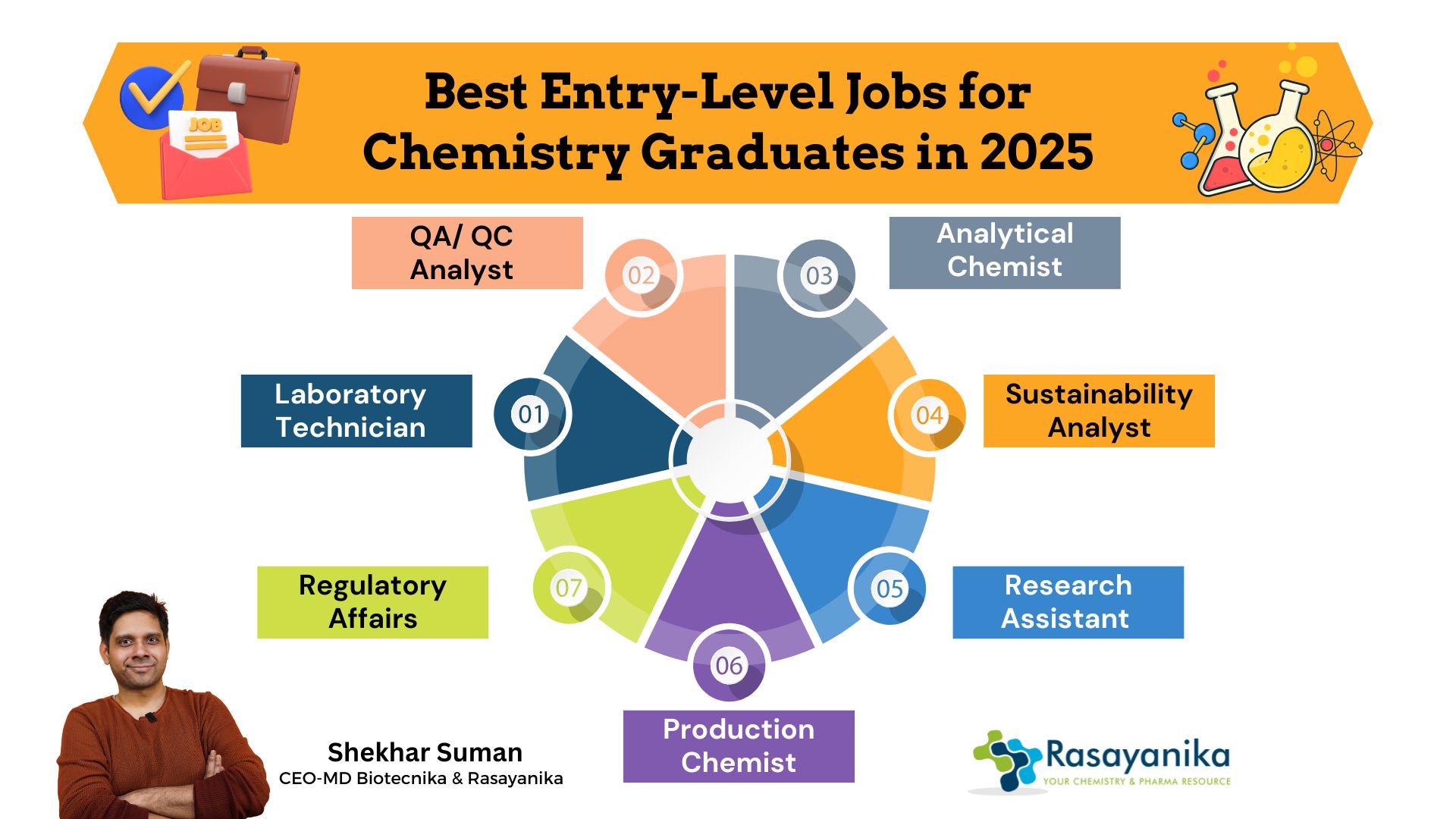Best Entry-Level Jobs for Chemistry Graduates in 2025
If you are a student who has just graduated in Chemistry and is looking for a perfect fresher job to start your career with, this article will be a guide for you. Having a degree in chemistry actually helps you get promising jobs in the industry. There are multiple roles available in the current job market. If you are interested in regulatory affairs, digital tools, or sustainability, here are various options available.
In this article, we’ll explore the best jobs for chemistry graduates. Not only will you understand roles, but you will also know which are the mandatory skills that are now highly valued, and how to prepare for those roles.
What’s Changing in the Field: Trends for 2025
Before understanding the different entry-level roles available, let us explore the various areas where one can find exciting opportunities in the industry.
- Green chemistry and sustainability: This area, once considered an emerging sector, is now becoming one of the larger fields where students can find exciting roles. To combat the challenges humanity faces today, it is essential to be aware of green chemistry and understand various sustainability measures. Companies working on biodegradable polymers, safer chemical substitutes, and carbon capture or utilisation can be a target for job opportunities.
- Graduates who can combine their knowledge of chemistry with data science, programming, or instrumentation have a strong advantage as various areas, such as Digital chemistry and automation, are gaining momentum. Joining these companies would help in understanding and working with modelling molecular structures to automate lab workflows.
- Regulatory, environmental, and quality-control roles are expanding due to tighter environmental legislation and increased consumer demand for product safety.
These shifts shape the types of jobs in demand for chemistry graduates, rather than what was typical a few years ago.
Top Entry-Level Jobs for Chemistry Graduates
Here are some of the best roles to consider if you’re graduating in chemistry and looking for your first job.
| Job Title | What You’ll Do | Why It’s a Strong Choice in 2025 | Typical Requirements |
| Laboratory Technician / Lab Assistant | Assist in experiments, maintain equipment, prepare samples, run routine tests (environmental, quality-control, pharmaceuticals) | This is a classic stepping stone. As companies automate more complex work, robust lab techniques remain critical. | BSc in chemistry (or related), good lab skills, attention to detail, and basic instrumentation experience. |
| Quality Control / Quality Assurance Analyst | Test raw materials and final products to ensure compliance with relevant standards (e.g., GMP, ISO), document findings, and oversee consistency. | Regulatory and consumer demand make QC/QA roles essential. Companies need these people to maintain trust and safety. | Strong analytical skills, understanding of QC/QA processes, ability to work methodically; sometimes experience/internship helps. |
| Analytical Chemist | Use instruments such as HPLC, GC-MS, and spectroscopy to analyze samples, interpret data, and report results. | As specialisation in pharmaceuticals, environmental monitoring, and food safety increases, so does demand for good analytical chemists. | Proficiency with instrumentation, good data-analysis skills, and and knowledge of regulatory guidelines. |
| Environmental Chemist / Sustainability Analyst | Measure pollutants, monitor water/air quality, ensure compliance, design or assist in green chemistry projects. | Environmental concerns are high globally; governments and industries are hiring. If you care about impact, this is fulfilling. | Some fieldwork, knowledge of environmental science, and possibly regulatory law; experience with GIS and data tools are pluses. |
| Research Assistant (Academic / Industrial) | Support research projects, run experiments, conduct literature review, and collect data. | Good if you aim for higher studies or want to explore advanced science; it also builds credibility. | Good grades, some research projects during the degree, lab skills, communication, and teamwork are important. |
| Process / Production Chemist | Oversee chemical synthesis or production processes, ensure safety, efficiency, and scale up bench chemistry to larger batches. | Industries like specialty chemicals, polymers,and food additives rely heavily on well-run production; automation makes these roles more dynamic. | Understanding of process chemistry, safety, and some exposure to scale-up, with good problem-solving skills. |
| Regulatory Affairs / Compliance Assistant | Help ensure products and processes comply with local and international regulations; assist in documentation, safety data sheets, and labelling. | As regulation tightens (e.g., for environmental, health, and safety), this area is growing. Even entry-level roles are
. |
Good writing and documentation skills, attention to detail, and an understanding of regulatory bodies are essential. It is also helpful to be familiar with specific regulations relevant to your region. |
Skills that are mandatory for securing a job:
If you are a candidate who wants to thrive in today’s job market, it is advised to possess the necessary skills required for the market. One can either enroll in a course to develop the essential skills needed for the job. The degree alone will not be sufficient in most cases; therefore, we recommend taking courses that align with your area of interest. This will help you build not only technical skills but also soft skills, and you can easily secure those entry-level jobs for chemistry graduates, as mentioned above.
- Technical Instrumentation & Laboratory Techniques: Familiarity with spectroscopy (e.g., UV-Vis, IR, NMR), chromatography (HPLC, GC), titration, and sample prep.
- Data Analysis & Computational Tools: Comfort with Excel/spreadsheets, statistical tools, and possibly basic programming (Python, R) or modelling software.
- Regulatory & Safety Knowledge: Understanding chemical safety, waste disposal, good manufacturing practices (GMP), and environmental regulations.
- Soft Skills: Communication (verbal & written), teamwork, problem-solving, attention to detail, ability to manage time and projects. Employers consistently flag these.
Geographic & Regional Opportunities (with a Focus on India)
For graduates in India (or similar markets), here are some specific opportunities and salary expectations:
- Government labs and agencies (like environmental boards, CPCB / State Pollution Control Boards, DRDO, ISRO) often recruit fresh chemistry graduates for testing, analysis, materials, and ecological roles.
- Entry-level R&D roles in pharma, petrochemicals, agrochemicals, and the food industries. Salaries for freshers may initially range from ₹3 lakh to ₹7 Lakh per annum, depending on the employer, skills, and location.
- Quality control, analytical chemistry, and environmental testing labs are especially active. Some roles may require certification (e.g., calibrated lab work) or internships/practical lab exposure.
These make India one of the most promising markets for entry-level jobs for chemistry graduates seeking steady growth.
How to Prepare & Land One of These Roles
To increase your chances of obtaining one of the best entry-level jobs for chemistry graduates, one should always consider the following areas;
- Internships/Projects: Consider securing lab internships during your degree program to gain valuable experience. Even small, voluntary projects that demonstrate hands-on work are highly valuable.
- Certifications & Workshops: Undertake short workshops on key instrumentation, regulatory affairs, or computational tools. Certifications in handling hazardous materials, lab safety, or GLP/GMP are pluses.
- Build a Strong CV / Portfolio: Highlight practical lab skills, any research work, and analytical thinking. If you have completed any independent work, such as publications, posters, or code, please include that.
- Network: Join professional societies (e.g., chemical societies, environmental associations), attend seminars or webinars. Sometimes roles are filled by individuals who are already known to labs or companies through their professional networks.
- Stay Updated on Trends: Know what industries are growing (sustainable materials, green chemistry, biotech, environmental remediation, etc.). Tailoring your job search toward those growing sectors gives you an edge.
Challenges & How to Overcome Them
No career path is without hurdles, and chemistry is no exception. But being aware helps:
- Competition: There will be numerous applicants for the same job position, but one can stand out from the crowd by acquiring the required skills. By possessing specialized skills and completing internships, one can secure jobs more easily.
- Experience Loops: Employers ask for experience, but you need experience to get employed. Solve via internships, project work, and part-time lab roles.
- Keeping Skills Current: Updates on Instruments, Software, and Regulations. Self-learning through online courses, reading journals, and attending workshops helps.
If you’re wondering “what are the best entry-level jobs for chemistry graduates in 2025?”, there’s no one-size-fits-all answer. However, there are multiple roles, such as laboratory technician, environmental chemistry, and regulatory affairs, that are among the strongest bets. If you have the perfect mix of technical skills along with a strong academic background, you can thrive well in the industry.
















































